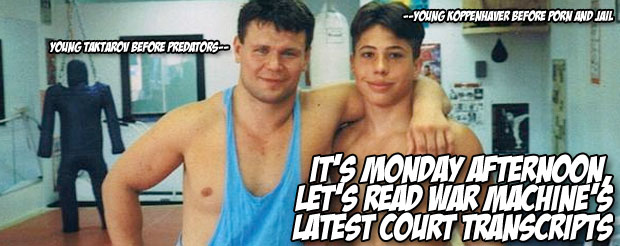My knowledge on court proceedings begins and ends with what’s represented by Judge Judy on daytime TV. Even then, I would only watch it when I was home from school sick, so when I took the time to read (and actually get caught up in) War Machine’s latest legal troubles via this court transcript, I developed a slight head cold. Kind of a weird Pavlov’s Bell effect going on here.
In honor of our former days of staying home from school sick and watching court shows, I present to you the transcript of Jon Koppenhaver’s latest hearing via The UG. It’s 100% worth the read in a daytime court sort of way.
——-
DISTRICT COURT
CLARK COUNTY, NEVADA
STATE OF NEVADA,
Plaintiff,
vs.
WAR MACHINE, aka, JONATHAN PAUL KOPPENHAVER,
Defendant. )
CASE NO. C276252-1
DEPT. XXI
BEFORE THE HONORABLE VALERIE ADAIR, DISTRICT COURT JUDGE
THURSDAY, FEBRUARY 2, 2012
RECORDER’S TRANSCRIPT OF HEARING RE:
SENTENCING
APPEARANCES:
FOR THE STATE: SHAWN A. MORGAN, ESQ.
Deputy District Attorney
FOR THE DEFENDANT: GARRETT T. OGATA, ESQ.
RECORDED: LAS VEGAS, CLARK COUNTY, NV., THURS., FEB. 2, 2012
THE COURT: State versus War Machine.
MR. MORGAN: Court’s indulgence.
Steve Miller.
Judge, we do have a speaker; I’d ask that he be able to speak last.
THE COURT: That’s fine.
And, Mr. Morgan, what’s the State’s position? No opposition to probation but has retained the right to argue all terms and conditions, and I’m assuming the underlying sentence as well?
MR. MORGAN: That’s correct, Judge. I just — I understand that we’re asking for probation, and I would ask that it be on the felony given the facts of this case, the extensive damage to the victim, and I think it’s appropriate given all the facts as well as when you look at the defendant’s other criminal history and his two prior violent felony convictions. With that I’d submit it.
THE COURT: And I’m assuming the 61,000 and change in restitution reflects the extensive medical bills that the victim had to incur as a result of this?
MR. MORGAN: That’s correct, Judge, workmen’s comp payout.
THE COURT: All right. Your true name is Koppenhaver but you’ve had it legally changed?
THE DEFENDANT: Yeah, I had it legal — I had to change it for legal reasons. I was getting sued for copyright infringement. It’s my nickname —
THE COURT: Right, you were a fighter?
THE DEFENDANT: Yeah.
THE COURT: All right. What if anything would you like to state to the Court before the Court pronounces sentence against you?
THE DEFENDANT: Well, I just want to say that, you know, like, my lifelong dream was to become a professional athlete and make it to the UFC, all right. I got into the UFC; I had a couple fights. And then when I lost my contract, I got, you know, I battled a lot of depression, and I got real self-destructive, and there’s about — about two and a half years, three years where I just kinda stopped caring about anything and acted like a jerk, you know. I never had gotten in trouble before, and these three years I just, you know, I went out a lot. I was drinking too much. I was getting in bar fights, and I was just, you know, acting irresponsible and acting stupid.
After this case I actually got into a fight in San Diego, and I served a year straight. I just got released in July. In that year I had a long time to sit there and think, you know. Before it’s like I was getting in trouble, getting in trouble, but I was never — I never got punished, you know. Like if you touch a hot stove and it doesn’t burn you, you touch it again, you know. So that year really gave me a lot of time to reflect, and a — and it remotivated me to get back into my career and do the right things. And since then I’ve been married.
I’ve been out for six months now and haven’t been in any trouble. I’ve been doing my anger classes. I’ve been staying sober, and I’ve just been avoiding bars and avoiding alcohol, and just, you know, trying to live life correct. I made a lot of mistakes but that year —
THE COURT: What are you doing to address your alcohol problems, and do you have, like, counseling or AA or —
THE DEFENDANT: No, I didn’t have an alcohol problem like that; I just had a problem with — really it was bars. It was a combination of bars and drinking and my temper and the fact that I just didn’t care about anything, you know. I mean, I was being — I get tested every — I’m on probation in California so I get tested, you know, once a week for alcohol. I do anger management classes, you know, and I’m just avoiding stuff. I’m staying in the gym, teaching classes, training, hanging out with my wife. I’m just not — I’ve just changed my lifestyle. I’m just — I’m not doing that anymore.
THE COURT: Mr. Ogata.
MR. OGATA: Thank you, Judge.
Judge, I think you’ve heard it from him. I think it’s pretty clear, and in fact, in know that in the time that I’ve know John it actually has changed a lot, drastically. I mean, even from the beginning, you know, there would be missed phone calls when we were supposed to talk on the phone. Now, it seems like he calls before I even get on the phone, before I even say did John call, he’s already left messages. And I know that a lot of that is on the side of what’s going on, but, Judge, I think he really — that year has really set him straight.
I know that he knows now when he fights he fights professionally. He fights in the gym. He fights in the ring. He gets paid for this. He does not need to do these bar fights, stupid bar fights, and I know that his priors, if you look at them, they’re all bar fights.
We went through the discovery of the medical bills, and that was one of the things that was concerning to me was that amount, but after reviewing it with John and going over this thing, it actually made sense, and he even told me, he says, you know what, I just want to make it right. I want to pay the guy off. I want to do what I need to do for probation. The issue I know with the State is we have no opposition to probation for the felony, but I know it’s a wobbler, and I know this is a stretch, Judge, is asking the —
THE COURT: Yeah, you know, you’re really stretching because here’s the thing. You know, he’s gotten in trouble before, and, you know, he’s a professional fighter —
MR. OGATA: I understand, Judge.
THE COURT: — and he’s picking on people who aren’t professional fighters. I mean, it’s ridiculous, and he says he wants to — he’s hurting himself. Well, he’s not punching himself in the face, I mean, you know, to be blunt. He, you know, he’s a professional fighter, and he needs to show, in my view, that he’s a tough guy, and he gets drunk, and he picks on people who are not professional fighters. I mean, to me, it’s not just some other, you know, drunken, you know, ordinary person like you or Mr. Morgan getting drunk and taking a swing in a bar. It’s a guy who’s trained to really hurt people —
MR. OGATA: I understand, Judge.
THE COURT: — and, you know, it’s a whole different — whole different thing than just a bar fight in my view. And so, you know, the time has come in my mind, Mr. Ogata, for a felony. And now what we’re talking about is his freedom, I mean, I’ll just be candid with you because, you know, it’s great he learned in jail and this and that, but, you know, maybe if he does really well, and he’s lucky enough to get probation, you can come see me later, but, you know, again, he, you know, I mean, I don’t really know why it took him a year of sitting in jail to figure out, oh, hey, I’m a professional fighter; I really shouldn’t be popping innocent people in the face, you know, because I get drunk and angry and I have a temper. You know, to me that should have been — he should have been a little more self-aware down the road.
And frankly, you know, wanting to be a professional fighter, you know, is like, kind of like wanting to be a rock star or a movie star, something like that. Not everybody gets to do it. So the fact that his career was, you know, going sideways a little bit, in my view is no justification, you know, for this kind of violence, and it’s repeated violence. So, I’ll just be candid with you, Mr. Ogata, that’s where we are when I looked at this.
MR. OGATA: So my request of reducing it down to a gross misdemeanor —
THE COURT: Well, you know, like I said he’s —
MR. OGATA: I just wanted to throw it out there, Judge. I know —
THE COURT: — if he’s lucky — if he’s lucky enough to get probation and he does really well, then you can pitch that to the Court. I’m not making any commitments or promises. We’ll see what direction his life takes, you know.
MR. OGATA: I understand, Judge.
THE COURT: But, you know, honestly, you know, he’s dangerous, and he’s dangerous because of his training and everything like that, and that makes it different than just some person out there getting in bar fights.
MR. OGATA: I understand, Your Honor.
THE COURT: In my view.
MR. OGATA: I think Mr. Koppenhaver understands that too; we’ve discussed that.
THE COURT: All right.
MR. MORGAN: Judge, we do have a speaker.
THE COURT: I know. Thank you. It’s Mr. Miller.
Is Mr. Miller here?
MR. MORGAN: Yes, Your Honor.
THE COURT: Sir, I need you to just follow my marshal and come up, you know, right here. Just right up here to the witness stand. And please, sir, remain standing facing our court clerk, and she will administer the oath to you.
(Speaker sworn.)
THE CLERK: Please be seated, and would you please state and spell your name.
THE SPEAKER: Steven Edward Miller, S-t-e-v-e-n, Edward, E-d-w-a-r-d, Miller, M-i-l-l-e-r.
THE COURT: All right, sir. Thank you for being here. What would you like to say today?
THE SPEAKER: I’d like to say there’s — first of all there’s a couple of corrections that need to be said from the opening from what I heard. First of all, it’s not a worker’s comp issue. The State picked it up because the company I worked for did not have valid worker’s comp insurance. So therefore I went 90 days after being kicked out of a hospital and not treated and getting the surgeries that I needed to where I was supposed to go to an assisted living facility to learn how to walk again because I had a broken left knee, fractured right ankle, torn ligaments in my right knee, along with a cut and the fracture over the bottom of my right eye. None of this was done. I still can’t do my duties at work properly.
And to sit there and say this was a drunken bar fight, we were both at work that night. I witnessed you go out and get into a fight with a customer. I took it to management. Management had you up at the front. I was dismissed to go back to the door where I work. You waited for me to turn to the side to walk away before you punched me. Plain and simple. Preyed on somebody as a professional that wasn’t even facing you. Okay.
Now, when you sit there and say, okay, yeah, the year, you sat there and had a year to think about it and everything else, all I have to ask is did you hear any remorse, any at all? If you had a year knowing that this date was coming up, I would think you would come up with a better excuse than what you had, honestly.
I mean, I still — I don’t know what they can do with my knee. I can’t even see a doctor seeing me on a medical lien because the case was dismissed out of bankruptcy court where the company was lost.
THE COURT: Oh, okay. So you did pursue a civil remedy —
THE SPEAKER: Yes. So there’s nothing left. There’s nothing else there. This is it.
THE COURT: All right. So no doctor will take it on a lien for your civil case?
THE SPEAKER: Right. I can’t work properly. I can’t bend. I wake up in the middle of the night. I don’t sleep properly. I don’t have the medications that I need, nothing. This has been going on for almost three years.
THE COURT: All right, sir, and what would you like to see happen today?
THE SPEAKER: Well, I sit there and I look at he was on probation from San Diego for another fight. Obviously not a drunken fight; it happened outside of a gym after training. Don’t go to a gym training on alcohol. At work, once again, not alcohol related. Everything that his attorney said, none of it makes sense. None of it’s the truth. It seems to me that it’s all fabricated, something to make you kind of feel a little bit weepy eyed to say, oh, yeah, he can do it on his own, but I know that you see through it.
THE COURT: Let me ask you this. The State in this case negotiated the case — and in fairness, it was not Mr. Morgan who negotiated it — and they’re agreeing to probation for this defendant.
Did you have an opportunity to discuss the negotiation with the State in this case before they entered —
THE SPEAKER: That was not discussed with me or with my attorney that’s in the courtroom as well. That was done totally outside of us, and I would not see probation, like you said, being a professional, going out and having actions like this, knowing the consequences of your actions; I don’t see where probation in my mind fits the crime. Basically, I can’t do what I’ve done for a living since ’94.
THE COURT: And let me ask you this. In the PSI it’s talking about just the injury because the Court, you know, we don’t get everything that the State has or the defense has. We get what they put in the PSI. They’re focusing on the injury to your face, but as — there obviously was more of a fight where your leg was injured and —
THE SPEAKER: Right. I had a broken left knee to where when I went to the ground my knee twisted. The upper leg turned causing the bottom of the kneecap, the bone to split out where I was supposed to have a pin inserted and have it fixed, but since there was no insurance that never happened. So anytime I turn to my left, there’s no anchor on my knee. It can pop out and just go. Other than that I had a fracture to my right ankle and torn ligaments in my right knee. So my right ankle still gets painful every once in a while because I didn’t get all the physical therapy. I didn’t have any surgeries that, once again, there’s supposed to be a pin. They were going to go in — or a plate, whatever it is they were going to do. I know I didn’t get treated right because of the insurance thing. So, you know, it’s ruined my life.
THE COURT: All right. Thank you for being here.
Does the State have any questions for the victim speaker?
MR. MORGAN: No, Judge.
THE COURT: Mr. Ogata, do you have any questions for the victim speaker?
MR. OGATA: No, Your Honor.
THE COURT: Sir, thank you for being here. And you can just follow my marshal and return to your seat next to your attorney who’s here in court today.
Here’s the thing. As I said, you know, he was a professional, and the victim in this case is a large man, but he, you know, tall man is what I mean, but he’s not a professional fighter, and it sounds like he — to use a colloquialism — kind of sucker punched him by having his head turned and then hit him. And again, you know, he obviously has issues with anger. I don’t know if there’s steroid abuse involved or what or it’s just something psychiatrically wrong with him.
I am going to follow the negotiation of probation; however, the time he spent in jail in San Diego is about that victim in San Diego. We’re about today this victim. So I think he needs to do jail time for this victim not the victim in San Diego because that doesn’t, you know, mean a hill of beans to the victim who’s sitting here. So I will go along with the negotiation having said that because there needs to be some punishment for what he did in Nevada and what he did to this victim.
All right. By virtue of your plea of guilty you are hereby adjudged guilty of the felony crime of attempt to commit battery with substantial bodily harm.
In addition to the $25 administrative assessment, the $150 DNA analysis fee and the fact that you must submit to a test for genetic markers, you are sentenced to a minimum term of 18 months in the Nevada Department of Corrections and a maximum of 60 months in the — I’m sorry, 48 months in the Nevada Department of Corrections; that’s the maximum on this charge, restitution in the amount of $61,114.92.
Your sentence is suspended. You are placed on probation for a period of time not to exceed 5 years. Sir, 5 years is the maximum on probation.
Here are the conditions of your probation. Number 1, you’re going to spend the next year for this crime in the Clark County Detention Center.
Number 2, when you’re released you’re going to complete anger management counseling. What you’re doing in San Diego may satisfy Nevada P and P, if not, you’re going to have to do separate anger management counseling, and I want you in that as soon as you’re released from custody.
Number 2 (sic), you’re not going to have the use, possession or control of alcohol, and I can see you steaming right there right now, the anger. You’re trying to control yourself. You have a serious issue because the next time you wind up killing somebody, and, you know, you’re going to be in prison for a minimum of 20 years.
THE DEFENDANT: I’m not steaming, ma’am.
THE COURT: Well, you look like you’re —
THE DEFENDANT: I’m just nervous. I’m —
THE COURT: Sir, that’s fine. I mean, you know, you know what you need to do. I don’t want any alcohol. You can’t frequent any establishments that serve alcohol as their primary function, casino bars, freestanding bars, anything like that.
You’re going to do — have a substance abuse evaluation. I want that done within 30 days of your release, and you’re going to do whatever counseling is deemed necessary.
You’re going to obtain lawful, fulltime employment to get this restitution paid. If you can make enough money as a fighter, that’s fine, but again, you know, that’s one of those professional athlete, model, singer, dancer, whatever, you know. Not everybody gets to do that. So you may have to get some other kind of a job to make restitution. That will be as directed by P and P.
I want you tested for the use of anabolic steroids because that in my view may be what’s contributing to your anger problem. Any use of anything like that will be considered a violation of your probation.
And finally, your probation is contingent on your good behavior within the Clark County Detention Center. So if there’s any bad behavior, that will be considered a violation, meaning beating up the other inmates, fighting with the guards, anything like that.
So we’re going to have a status check regarding your behavior in the detention center before I release you on your probation because again, you know, you’re a professional fighter in there, and I don’t want any kind of problems in the detention center.
Let’s status check it for six months to see how he’s doing.
MR. MORGAN: And, Judge, just so the record’s clear, the restitution needs to be ordered to the Division of Industrial Relations not the victim.
THE COURT: All right. You know —
MR. OGATA: Judge, he’s requesting if he can get his things in San Diego together because he had to travel here. He’s showed up for every court date for —
THE COURT: Doesn’t he have a wife?
MR. OGATA: He does.
THE COURT: Can’t she do it?
THE DEFENDANT: My wife — my wife’s an immigrant from Hungary, and she doesn’t have a license, none of that stuff. She doesn’t have anyone here but me. It’s just her and I together here. She moved here from Hungary a year ago. And, I mean, like when I did my year in San Diego, I turned myself in. I did the time. There was no problem, you know. I just want to get my stuff in order —
THE COURT: Sir, I’m not anticipating a problem. I’m anticipating that you’re going to be a good inmate, but I’m looking at you; you’re a professional fighter. I just want to make sure you understand that it’s not going to be do whatever you do at the Detention Center and then go on your merry way and I’m not monitoring what you’re doing at the Detention Center —
THE DEFENDANT: I understand. Ma’am —
THE COURT: — ‘cause we’ve had other professional fighters in the Detention Center, and I just need to know that you’re on your best behavior and not taking advantage of your superior training or whatever.
THE DEFENDANT: Can I say one thing. When I did my year in San Diego I was never involved in one fight.
THE COURT: That’s good. Then there should be no problems.
THE DEFENDANT: So I’m just letting you know that, you know, I haven’t had any problems since then.
THE COURT: Good. That’s fine then.
MR. OGATA: So the request, Judge, I know that he’s complied — I mean, he’s been to every court date that I’ve ever had with him. He will comply with any requirements —
THE COURT: What is it you need to do in San Diego?
THE DEFENDANT: Well, I need to get rid of my car. I want to, like, put my stuff in storage. I want to get everything done, get my wife situated. I mean, we came here thinking that we’re getting probation and that was it. So this is like a shock. That’s why I might look — whatever you said I looked like. I’m just nervous. I didn’t expect this, and she doesn’t expect it, and, you know, my job, I want to get —
THE COURT: Mr. Ogata?
MR. OGATA: Judge, the request is, I mean, if we can get some time for him to get these things together. I know that he can come back and check himself back in.
THE COURT: Here’s the deal. I’ll give you two weeks for a surrender date. Understand this, you don’t come back, you get in a fight, you get in trouble, get a DUI, anything like that, you’re going to prison. There is no probation. So basically, you know, the future’s in your hands, you know, and we’ll modify this, you know, give you 19 months on the bottom end in prison instead of the Detention Center.
So just appreciate that basically, you know, it’s up to you now to come back, not get in trouble, and then we’ll, you know, you’ll get the opportunity at probation.
THE CLERK: Surrender date is February 16 at 9:30.
THE COURT: Mr. Ogata, is that for you?
MR. OGATA: That’s it, Your Honor.
THE COURT: Thank you, sir.
MR. OGATA: Thank you, Judge..
[Source]









